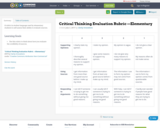
A rubric in student language used by elementary students to self-assess their ability to evaluate sources.
- Subject:
- English Language Arts
- History
- Social Science
- Material Type:
- Assessment
- Date Added:
- 07/03/2017

A rubric in student language used by elementary students to self-assess their ability to evaluate sources.

Learning outcomes: Evaluate consumer health sites based on three criteria: source, accuracy, currency.Discuss contexts, uses and best practices for consumer health information in practice.
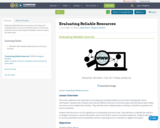
Link to Evaluating Reliable Sources lesson from Teaching Tolerance. Lesson focuses on locating and verifying online resources. Students learn to locate and evaluate sources and compare multiple resources about the same topic.
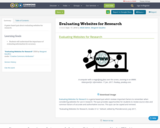
A game-based quiz about evaluating websites for research.
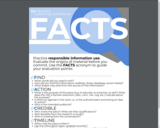
FACTS is an acroynm to help students remember key points when evaluating information.
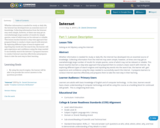
Whether information is needed for study or daily life, the Internet has developed into an essential source of knowledge. Collecting information from the Internet may seem simple, however, at times one may get an overwhelmingly large number of results for simple queries, some of which may not be relevant or reliable. This lesson teaches learners a step-wise approach that prepared them to conduct a basic search with internet. By exploring different types of search engines and inputting key words into the search bar, the learner will gain experience and confidence using the steps needed to successfully search the internet. It prepares learners to conduct Internet searches effectively and prepares them to take the next step in their learning.
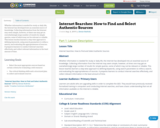
Whether information is needed for study or daily life, the Internet has developed into an essential source of knowledge. Collecting information from the Internet may seem simple, however, at times one may get an overwhelmingly large number of results for simple queries, some of which may not be relevant or reliable. This lesson teaches learners a step-wise approach to defining keywords, using search parameters to refine a search, and evaluating the appropriateness of sources. It prepares learners to conduct Internet searches effectively, and collect relevant information in the least amount of time.
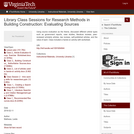
Using source evaluation as the theme, discussed different article types such as government reports, case studies, literature reviews, peer-reviewed scholarly articles, law reviews, self-published articles, and the value of each. Class included a hands-on activity with worksheet.

In this lesson, students will develop media literacy skills by analyzing and evaluating real versus fake news sources. Students learn how to identify various types of fakes news and apply critical thinking to evaluate if the information is reliable and unreliable.Image attribution: https://flic.kr/p/XKaGVH
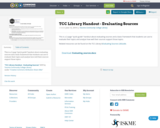
This is a 2-page "quick guide" handout about evaluating sources and a basic framework that students can use to evaluate their topics and analyze how well their sources support those topics.